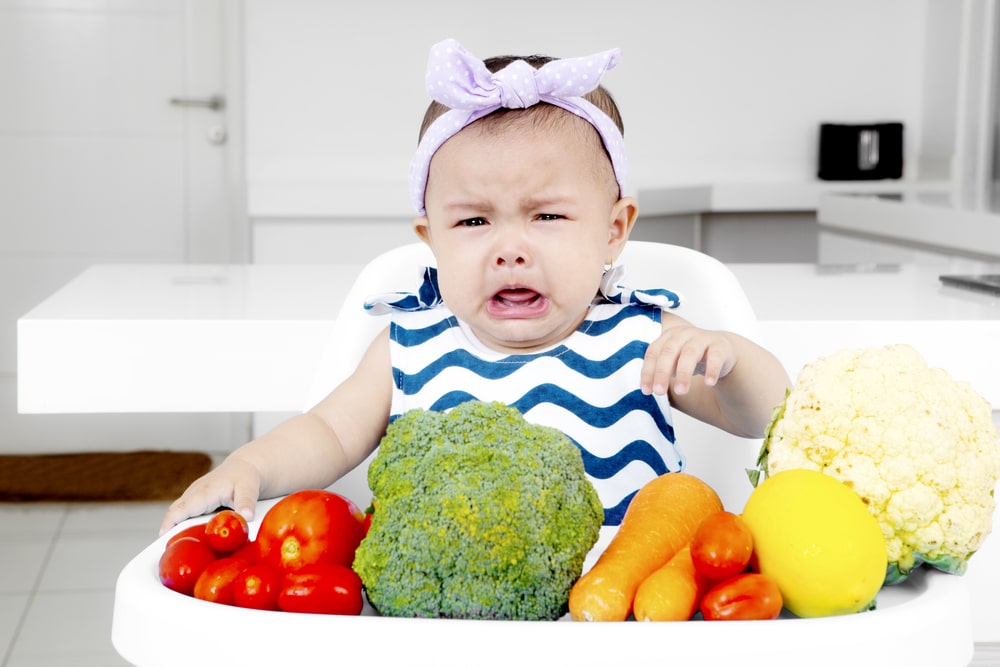If you’ve noticed that your little one is fussy and crying while eating solids, don’t panic. There are many reasons why this might be happening, and we’ve put together some of our top tips to help you out!
Your baby may not like the food that they’re eating, or they may not be ready to eat solids. But whatever the reason, it can be a frustrating time. Here are some of the top reasons that your baby might be crying when they are eating solid foods.
Reasons Why Your Baby Is Crying While Eating Solids
There are many reasons why your little one isn’t eating solids well or is fussy or crying when you are feeding them solids. Here are some of the main reasons that your little one is upset when they are eating solid foods.
Hungry Or Full
One of the simplest reasons that your baby may not be happy eating solids is because they are too hungry or too full. If there is too long a gap between your baby’s meals, your baby might refuse to eat solids. Similarly, if your baby is too hungry they won’t accept any solids either.
Your baby is experiencing lots of new flavors and textures as you are beginning to give them solid foods, and if they are too hungry, then a new solid food might exacerbate the problem.
When your little one is hungry, they will only want comfort food, as we do when we’re hungry, and for your baby, their comfort food is milk.
If your baby is too full, they may not be in the mood to try any new foods.
If your baby has already had milk and is reluctant to try any new foods, then you can assume that they are a little full, and you may need to leave a longer gap between feeding them milk and offering them some solids.
Tired
View in gallery
You may be trying to feed your little one when they are too tired. Again, when babies are feeling fussy or tired, they want comfort, and milk is their comfort.
Your little one needs to be awake and happy when they are trying new things, so you should consider offering them some new foods after they’ve been awake for a while.
Choose a time after your little one has awoken and is playing, but before they get too tired. This will ensure that your baby is in a good mood to try something new, and isn’t too worn out from playing.
Discomfort
Your baby might be uncomfortable, and just like you, when they are feeling uncomfortable, they won’t want to be trying any new foods. Crying is the way that your baby communicates with you, so if they are crying there is likely something wrong.
Your little one might have a full diaper or they may be uncomfortable in their highchair. Check that the straps are not too tight or that your little one isn’t sitting on anything uncomfortable that has fallen into the highchair.
Your little one might also be gassy or constipated so make sure that this isn’t the case. If you think your little one might be gassy or constipated, consider consulting with your pediatrician before you continue to give them solids.
Teething
Teething is one of the primary reasons that your baby will be fussy and irritable, so if you notice that your baby is more reluctant to eat solids than usual, they may be teething. If this is the case, your baby might be more likely to want their comfort food, which is probably milk.
If your little one is teething, consider sticking to some cooler solids that may be softer on your little one’s gums. Think of offering them things such as bananas, apples, or yogurt.
Texture
View in gallery
Just like adults, babies may not like something simply because of the texture. Your baby may prefer the texture of a more pureed food, like a pureed fruit or vegetable, or they may like something longer than they can hold, such as apple wedges or carrot sticks.
If your little one is fussy because of texture, trial and error is the only way to figure out what your little one prefers.
If they dislike the pureed form of food, like a pureed strawberry or a mashed potato, consider giving them the whole version of this food, like some sliced strawberries or boiled potatoes. You may find that your little one prefers these textures to their softer counterparts.
Pressure
Your little one may be having some issues with solids because they feel pressure to eat or enjoy these foods.
Try not to crowd your baby or hover over them as they eat, and if they are reluctant with a certain food, try not to show your anger or frustration, as this will only make your baby feel more pressure.
Also, avoid feeding your baby by force. Think about how you might feel if someone was jamming a spoon into your mouth.
If you are trying to feed your baby by force, this can make them feel even more pressure to eat, and can even cause psychological issues surrounding food in the future.
Tips For Feeding Solids To Your Baby
Once you have figured out why your little one is fussy and irritable when eating solids, you may be looking to switch up your approach. Here are some of our top tips for introducing solids to your little one.
Texture
Consider varying the texture of the food that you offer to your little one. If they love soft foods like mashed bananas, mashed potatoes, yogurt, and pureed fruit, consider offering them something tougher to see how they respond.
View in gallery
Little ones love to feed themselves, so consider giving them veggie sticks, like carrots, cucumbers, or even bell peppers for a fun texture. They may like something crunchy, so consider offering them something like chips.
There are plenty of chips available made specifically for little ones, so one of these is your best bet. You could always try some of the pre-made baby food and see if you are more successful.
Time
Introducing your baby to solids can be a tricky business, so consider taking your time in making these introductions. Start off by introducing solids during one meal of the day, or during snack time.
Continue to offer your little one milk during their other mealtimes and introduce some different foods slowly, to avoid any unnecessary stress.
Stress
Don’t worry if your baby doesn’t like something. As they are beginning to sample new foods regularly, it is worth offering them something a few times before deciding whether or not it is something that they like.
If you notice that after several tastings your baby still doesn’t like something, avoid offering them it again. We don’t like every food that is put in front of us, and your baby will be no different!
FAQs
How do I get my fussy baby to eat solids?
If your baby is fussy, be flexible and patient – you could skip solids at that meal and try at the next meal. There is no need to rush and feeding babies is a slow process, especially when they are just starting out.
View in gallery
What do I do if my baby doesn’t like purees?
If your baby is not fond of runny purees you could try thickening them up a little bit until you find the right consistency for them.
When should I worry about my baby not eating anything?
If your baby is still resisting solids at seven or eight months it would be worth having a chat with a healthcare professional.
Children normally develop eating skills between six months to a year old and if they are still refusing then there is the chance that they may miss that window.
The Final Thought
There are a whole host of reasons why your little one may not be happy with their solids, but most of them are not any reasons to worry. If your baby continues to be fussy when eating solids and this is a cause for concern, consult with your pediatrician who will be able to offer you advice.
The most important thing to remember is that every baby is different, so if your little one is responding to solids slower than some of the little ones around them, this isn’t necessarily a reason to worry.
And if you’re wondering whether your little one is able to eat some of the most popular foods, check out When Can Babies Eat Tomatoes?






